Related Research Articles
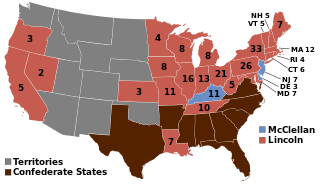
The 1864 United States presidential election was the 20th quadrennial presidential election. It was held on Tuesday, November 8, 1864. Near the end of the American Civil War, incumbent President Abraham Lincoln of the National Union Party easily defeated the Democratic nominee, former General George B. McClellan, by a wide margin of 212–21 in the electoral college, with 55% of the popular vote. For the election, the Republican Party and some Democrats created the National Union Party, especially to attract War Democrats.

The Reconstruction era was a period in American history following the American Civil War (1861–1865) and lasting until approximately the Compromise of 1877. Its main goals were to rebuild the nation after the war, reintegrate the former Confederate states, and address the social, political, and economic impacts of slavery.

The States' Rights Democratic Party was a short-lived segregationist political party in the United States, active primarily in the South. It arose due to a Southern regional split in opposition to the regular Democratic Party. After President Harry S. Truman, the leader of the Democratic Party, ordered integration of the military in 1948 and other actions to address civil rights of African Americans, including the first presidential proposal for comprehensive civil and voting rights, many Southern white politicians who objected to this course organized themselves as a breakaway faction. They wished to protect the ability of states to maintain racial segregation. Its members were referred to as "Dixiecrats", a portmanteau of "Dixie", referring to the Southern United States, and "Democrat".

In the 1860s, the Copperheads, also known as Peace Democrats, were a faction of the Democratic Party in the Union who opposed the American Civil War and wanted an immediate peace settlement with the Confederates.
The Radical Republicans were a faction within the Republican Party originating from the party's founding in 1854—some six years before the Civil War—until the Compromise of 1877, which effectively ended Reconstruction. They called themselves "Radicals" because of their goal of immediate, complete, and permanent eradication of slavery in the United States. They were opposed during the war by the Moderate Republicans, and by the Democratic Party. Radicals led efforts after the war to establish civil rights for former slaves and fully implement emancipation. After unsuccessful measures in 1866 resulted in violence against former slaves in the rebel states, Radicals pushed the Fourteenth Amendment for statutory protections through Congress. They opposed allowing ex-Confederate officers to retake political power in the Southern U.S., and emphasized equality, civil rights and voting rights for the "freedmen", i.e., former slaves who had been freed during or after the Civil War by the Emancipation Proclamation and the Thirteenth Amendment.
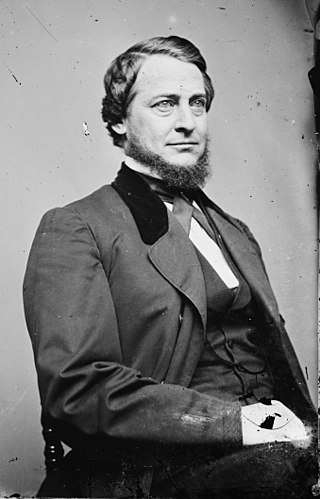
Clement Laird Vallandigham was an American lawyer and politician who served as the leader of the Copperhead faction of anti-war Democrats during the American Civil War.
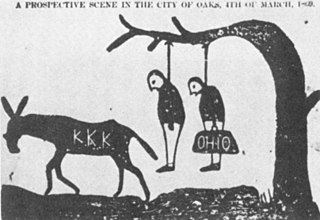
In United States history, the term scalawag referred to white Southerners who supported Reconstruction policies and efforts after the conclusion of the American Civil War.

The Solid South or the Southern bloc was the electoral voting bloc of the states of the Southern United States for issues that were regarded as particularly important to the interests of Democrats in those states. The Southern bloc existed between the end of the Reconstruction era in 1877 and the passage of the Civil Rights Act of 1964. During this period, the Democratic Party overwhelmingly controlled southern state legislatures, and most local, state and federal officeholders in the South were Democrats. During the late 1800s and early 1900s, Southern Democrats disenfranchised blacks in all Southern states, along with a few non-Southern states doing the same as well. This resulted essentially in a one-party system, in which a candidate's victory in Democratic primary elections was tantamount to election to the office itself. White primaries were another means that the Democrats used to consolidate their political power, excluding blacks from voting in primaries.
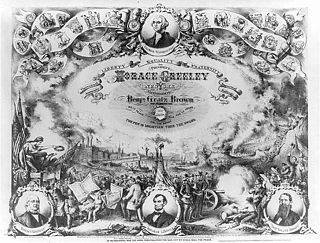
The Liberal Republican Party was an American political party that was organized in May 1872 to oppose the reelection of President Ulysses S. Grant and his Radical Republican supporters in the presidential election of 1872. The party emerged in Missouri under the leadership of Senator Carl Schurz and soon attracted other opponents of Grant; Liberal Republicans decried the scandals of the Grant administration and sought civil service reform. The party opposed Grant's Reconstruction policies, particularly the Enforcement Acts that destroyed the Ku Klux Klan. It lost in a landslide, and disappeared from the national stage after the 1872 election.
The Redeemers were a political coalition in the Southern United States during the Reconstruction Era that followed the Civil War. Redeemers were the Southern wing of the Democratic Party. They sought to regain their political power and enforce White supremacy. Their policy of Redemption was intended to oust the Radical Republicans, a coalition of freedmen, "carpetbaggers", and "scalawags". They generally were led by the White yeomanry and they dominated Southern politics in most areas from the 1870s to 1910.

Henry Horatio Wells, a Michigan lawyer and Union Army officer in the American Civil War, succeeded Francis Harrison Pierpont as the appointed provisional governor of Virginia from 1868 to 1869 during Reconstruction. A Radical Republican labeled a carpetbagger, Wells was defeated for election in 1869 by Gilbert C. Walker, who also became his appointed successor. Wells then served as U.S. Attorney for Virginia and later for the District of Columbia.

Joel Parker was an American attorney and Democratic Party politician who served two non-consecutive terms as the 20th governor of New Jersey from 1863 to 1866 and 1872 to 1875. As a Democratic governor during the American Civil War, Parker was one of the leading critics of the Abraham Lincoln administration's domestic and military policy, though he was generally a supporter of the Union war effort. In 1868 and 1876, he was nominated for President of the United States as a favorite son by New Jersey's party delegation.
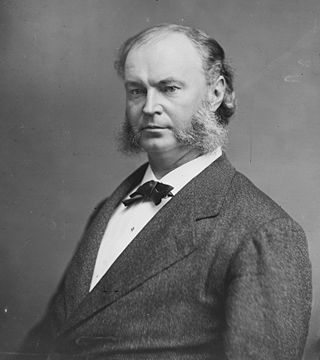
Theodore Fitz Randolph was an American attorney, businessman, and politician who served as the 22nd governor of New Jersey from 1869 to 1872 and represented the state in the United States Senate from 1875 to 1881. He was the son of U.S. Representative James F. Randolph.
The 1864 Democratic National Convention was held at The Amphitheatre in Chicago, Illinois.
Popular opposition to the American Civil War, which lasted from 1861 to 1865, was widespread. Although there had been many attempts at compromise prior to the outbreak of war, there were those who felt it could still be ended peacefully or did not believe it should have occurred in the first place. Opposition took the form of both those in the North who believed the South had the right to be independent and those in the South who wanted neither war nor a Union advance into the newly declared Confederate States of America.
The Crisis was a newspaper published during the first half of the American Civil War by Samuel Medary that was critical of the American government's decision to limit slavery, and following the beginning of the war against the Confederate States of America, to wage war against the South. It was presented as the newspaper for favor with "Peace Democrats" - those northerners who sided with the Confederate cause during the war.
Ex parte Vallandigham, 68 U.S. 243 (1864), is a United States Supreme Court case, involving a former congressman Clement Vallandigham of Ohio, who had violated an Army order against the public expression of sympathy for the Confederate States and their cause. Vallandigham was tried before a military tribunal by Major General Ambrose E. Burnside for treason after he delivered an incendiary speech at Mount Vernon; he then appealed the tribunal's verdict to the Supreme Court, arguing that he as a civilian could not be tried before a military tribunal.
War Democrats in American politics of the 1860s were members of the Democratic Party who supported the Union and rejected the policies of the Copperheads. The War Democrats demanded a more aggressive policy toward the Confederacy and supported the policies of Republican President Abraham Lincoln when the American Civil War broke out a few months after his victory in the 1860 presidential election.
The Northern Democratic Party was a leg of the Democratic Party during the 1860 presidential election, when the party split in two factions because of disagreements over slavery. They held two conventions before the election, in Charleston and Baltimore, where they established their platform. Democratic Candidate Stephen A. Douglas was the nominee and lost to Republican Candidate Abraham Lincoln, whose victory prompted the secession of 11 Southern states and the formation of the Confederate States of America.

"Radicalism" or "radical liberalism" was a political ideology in the 19th century United States aimed at increasing political and economic equality. The ideology was rooted in a belief in the power of the ordinary man, political equality, and the need to protect civil liberties.
References
- ↑ Katz, Elizabeth D. (2021-07-30). "Sex, Suffrage, and State Constitutional Law: Women's Legal Right to Hold Public Office". Rochester, NY. SSRN 3896499.
{{cite journal}}: Cite journal requires|journal=(help) - ↑ Summers (2009)
- 1 2 3 4 Ward McAfee (1998). Religion, race and Reconstruction. SUNY Press. pp. 22–26. ISBN 0-7914-3847-3.
- 1 2 3 "Review of "The Democratic Party and The Negro: Northern and National Politics, 1868-92" (PDF). Retrieved 2009-07-25.
{{cite journal}}: Cite journal requires|journal=(help) - ↑ Judson Clements Ward, Jr., "The New Departure Democrats of Georgia: An Interpretation," Georgia Historical Quarterly, Fall 1957, Vol. 41 Issue 3, pp 227-236
- ↑ pp. 338-442, Vallandigham, James L. A Life of Clement L. Vallandigham. Baltimore, MD: Turnbull Brothers, 1872.
- ↑ p. 446, Vallandigham, James L. A Life of Clement L. Vallandigham. Baltimore, MD: Turnbull Brothers, 1872.